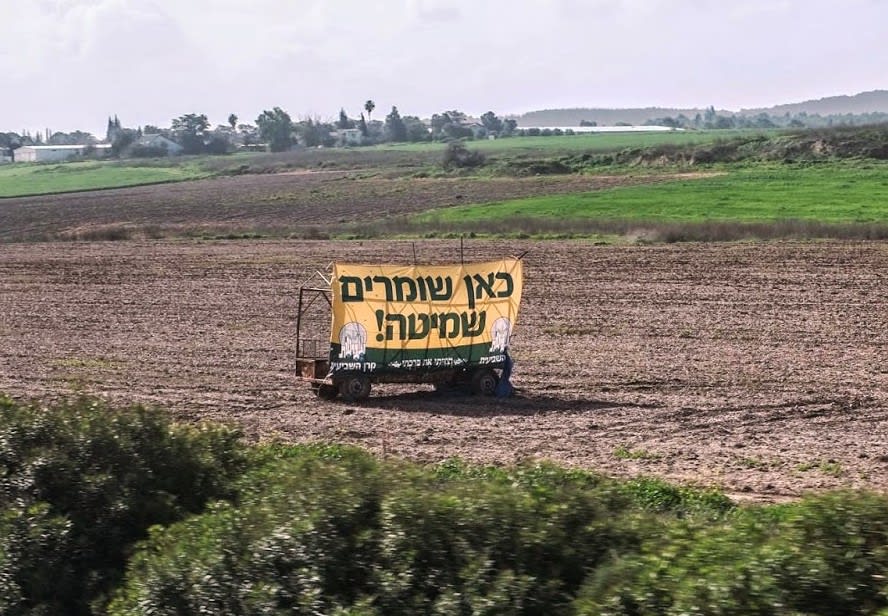
This year is Shmitta. After six years of working the land there is a mitzvah to let it lie fallow. Perhaps this is the first shmita year since we made our Aliyah that I feel I am personally connecting to the mitzvah in a meaningful way. It represents a perfect combination of the laws that are between man and his fellow and the laws that are between man and his G-d. I think about it all the time these days. The connection of Shmitta to the laws between man and his fellow is something that operates on a very emotional level. Those of us who live here in Israel live in a volatile place; kassam missiles in Sederot, ominous terrorist threats and report after report of “Israeli” Arabs that aid and abet their Palestinian brethren without thinking twice. Ever since the second Lebanon war, ever since the kidnappings I have a hard time rationalizing any commerce, financial or otherwise, with those that seek to destroy us.
Perhaps it is the childlike face of Gilad Schalit that haunts me most. I see his dark eyes and shy smile in that picture of him in the baseball cap and I inwardly cry. My heart breaks for him, his parents and for our people. I can’t even imagine what he’s going through. I’m afraid to go there. I pray that surely there must be a few kind people where he is, may G-d somehow direct them to him. I pray that he never forget that he is part of a nation that believes each person is responsible for the next, a nation that believes as Rabbi Akiva stated many years ago,” Love thy Neighbor” is the major principle of the Torah. And for all of the above, I can not in good consciousness financially support Arab agriculture during this year of Shmitta.
I stood in the vegetable store the other day staring at crates of Arab tomatoes and cucumbers. I know the kashrut certificate hanging on the wall represents impeccable standards of halacha, but inside I felt a wall of sadness build up as I looked around. Many people came in and bought vegetables, all I could do was flee. Certainly there are some Arabs that don’t seek our destruction, that are just trying to make a living. What’s unclear is how to distinguish whose cucumbers, zucchini and tomatoes you are getting- those of a bitter enemy or a more innocuous person. I have this vision of those that detest us with a bitter and deep hatred, laughing up their sleeves as we pay higher and higher prices for them to feed us.
Shmitta has forced me to consider how a simple action like buying a kilo of tomatoes goes way beyond the usual shopping trip. It has become an exercise in Ahavat Yisrael, a way of aligning with our people. Although it is true that some may have to buy Arab produce at some point in this shmitta for practical and necessary reasons, shouldn’t it hurt? The farmer that grows vegetables in Kalkilya might very well one day be the guy who has deep connections to the Tanzim or Fatah.
Shmitta has taught me the very Jewish value of appreciating each and every soul in Israel. I can not sell out on Gilad, not without a fight.
Shmitta has also forced me to recognize the value that G-d put into every living growing thing. How many hundreds of times have you made salad? Ever think twice before you throw out the peels? Most of us just dump what we don’t need into the garbage. Not these days, now when I make a salad every little peel, every extra seed is a valuable thing to be reckoned with. Nothing can go to waste, everything must be accounted for. It is holy. It can not be disposed of in the usual manner, it must be collected, wrapped up and left to decompose in the natural way G-d intended it to be.
At the end of the day, Shmitta teaches us that it is G-d and G-d alone that owns this world, even the peels of a cucumber. It is to Him that I must pay homage.
Keeping the holiness of the seventh year is not a pain, it is a privilege. It is a concrete way of expressing belief in G-d’s domain. A tomato is no longer a mere salad ingredient, it is an agent of G-d teaching us valuable lessons in belief and gratitude for all the good He has bestowed upon us.
May this year of Shmitta bring Gilad ben Aviva, Ehud ben Malka and Eldad ben Tova as well as all the other Jewish soldiers whose fate is unknown-Home.
Leah Nechama Finson
The words of this author reflect his/her own opinions and do not necessarily represent the official position of the Orthodox Union.

